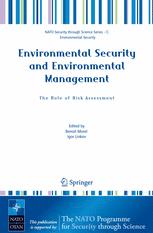

Most ebook files are in PDF format, so you can easily read them using various software such as Foxit Reader or directly on the Google Chrome browser.
Some ebook files are released by publishers in other formats such as .awz, .mobi, .epub, .fb2, etc. You may need to install specific software to read these formats on mobile/PC, such as Calibre.
Please read the tutorial at this link: https://ebookbell.com/faq
We offer FREE conversion to the popular formats you request; however, this may take some time. Therefore, right after payment, please email us, and we will try to provide the service as quickly as possible.
For some exceptional file formats or broken links (if any), please refrain from opening any disputes. Instead, email us first, and we will try to assist within a maximum of 6 hours.
EbookBell Team

0.0
0 reviewsThe concept of “environmental security” has emerged as one basis for understanding international conflicts. This phrase can mean a variety of things. It can signify security issues stemming from environmental concerns or conflicting needs, or it can mean that the environment is treated as a resource for the long term, and the question is what should be done today to preserve the quality of the environment in the future. In the same way that energy security is about ensuring access to energy for the long run, it can also mean that pressing environmental concerns create a situation where different countries and communities are forced to collaboratively design a unified response, even if cooperation is not generally in the logic of their relations. Over the last several years, the authors of this book and their colleagues have tried to demonstrate the power of risk assessment and decision analysis as valuable tools that decision makers should use for a broad range of environmental problems, including environmental security. Risk analysis is almost more a state of mind or a way of looking at problems than it is a kind of algorithm or a set of recipes. It projects a kind of rationality on problems and forces a certain degree of quantitative rigor, as opposed to the all too common tendency of making environmental recommendations based on anecdotal evidence.